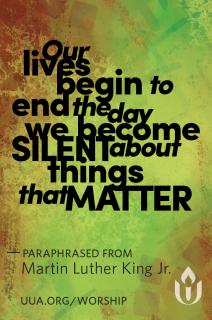Who Is Freedom For?

We gather at Thanksgiving, in some sense, to retell the creation myth of our country. In this myth is our very best and our very worst: a boldness; a care for the common good; a wish to say we before I. Yet from even before the first Thanksgiving feast, it’s a story of theft and violence, and a ruthlessly narrow definition of who “we” really means.
The colonists had come seeking freedom, and in that we identify with them. But it was freedom only for themselves. In every generation forward, from that day to this, the people living in this land that became America struggled always with the question: Who is freedom for?
Black persons were taken from their native Africa to become slaves. Immigration laws were written explicitly to prohibit non-Western Europeans. Women could not vote even a century ago. In many states right now, gays and lesbians can be legally fired or evicted merely for not being straight. Refugees knock and, in response, voices call to bar the door.
The Universalist minister Clarence Skinner wrote, a century ago:
The fight for freedom is never won… Each generation must win for itself the right to emancipate itself from its own tyrannies, which are ever unprecedented… Therefore those who have been reared in freedom, bear a tremendous responsibility to the world to win an ever larger and more important liberty.
So may it be for us. We are the inheritors of our liberty, won with sweat and labor and blood of generations before us. May we be a people committed to winning an ever larger liberty for the generations that follow.
Who is freedom for? May we answer, today and always: every one of us.
| Date added | |
|---|---|
| Tagged as |